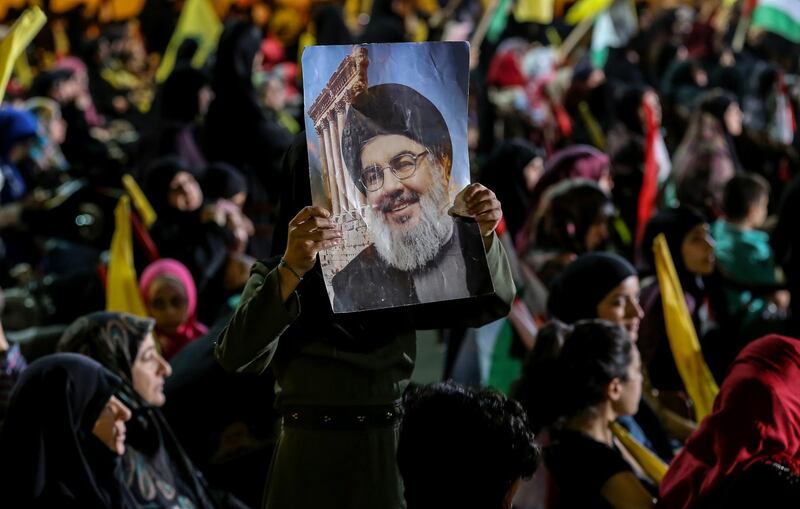The latest revelation that an Iranian-backed terror group has been stockpiling bomb-making materials in London has shed fresh light on Tehran's reach in Europe.
For decades after the Islamic revolution of 1979, Iran mainly confined its terrorist activities to the Middle East region, using the Revolutionary Guard Corps and proxies such as Hezbollah to target opponents and undermine moderate Arab regimes.
There was, of course, the brief flurry of terrorist activity in Paris in the immediate aftermath of ayatollah Ruhollah Khomeini’s emergence as the leader of the revolution, as his followers sought to neutralise opponents of the clerical regime. Other notable acts of Iranian terrorism outside the region include the infamous 1994 attack against a Jewish institution in Argentina, which killed 85 people.
But for the most part, the focus of Iran’s activities has been confined to the region, where attacks have been deployed as an effective tactic in support of Tehran’s drive for regional dominance.
Now, intelligence officials in Europe are undertaking a radical reappraisal of that view in the light of recent events. Earlier this week, it was revealed that London raided a terrorist cell with links to Hezbollah four years ago. It was stockpiling three tonnes of explosive materials on the outskirts of London in what has been described as a secret bomb factory.
The bomb-making group was discovered in the autumn of 2015, shortly after Britain had become one of the signatories to the controversial nuclear deal.
Even though former prime ministers David Cameron and Theresa May – who was then serving as home secretary – were informed of the discovery, the fact that it was not made public suggests they were keen not to reveal any information that might damage the flawed nuclear agreement.
Even now, British authorities are reluctant to disclose too many details. A brief statement issued by the Metropolitan Police this week simply stated that counter-terrorism specialists had raided four properties at addresses in north-west London – three businesses and a home – and that a man in his 40s was arrested on suspicion of plotting terrorism, although he was later released without charge.
However, British intelligence officials close to the investigation believe the stockpile was part of an international Hezbollah scheme for future terror attacks in Europe. They have drawn parallels between the stash of chemicals discovered in London and a similar case in Cyprus at around the same time. Hassan Bassam Abdallah, a 28-year-old member of Hezbollah's military wing, was convicted of possessing 65,000 ice packs filled with ammonium nitrate which he admitted were for use in future terrorist attacks in Larnaca. He was subsequently jailed for six years.
For years, whenever I have raised the subject with senior British intelligence officials, they have repeatedly denied the existence of Iranian-backed sleeper cells in the UK, maintaining the traditional line that Iran’s terrorist activity was mainly confined to the Middle East.
But in reality, the discovery of this London bomb factory is part of an upsurge of Iranian terrorist activity in Europe in the past decade.
Concerns that Hezbollah had expanded its operations in Europe first surfaced in 2012 when the group carried out a bomb attack against a tour bus in Bulgaria, prompting the European Union to follow America’s lead in designating Hezbollah’s military wing as a terrorist organisation.
In June last year, two Iranian diplomats were expelled from the Netherlands for plotting political assassinations in the country, while France’s intelligence ministry foiled a bomb plot the same month to target a rally of opposition groups in Paris. Then, in October, Danish authorities accused Iran of an “unusual and serious” plot to murder an Arab separatist leader.
One positive outcome from Iran’s increased terrorist activity has been to push the British government to finally designate the entirety of Hezbollah as a terrorist organisation. Previously, London sought to make a distinction between the group’s political and military wings, with only the latter designated a terrorist organisation, thereby allowing representatives of the political wing to maintain links with prominent British politicians such as Labour leader Jeremy Corbyn.
Moreover, the growing awareness that Iran's terrorist infrastructure poses a threat to Europe comes at a time when Iranian aggression is increasing in the Middle East.
Saudi officials have accused Tehran of being behind a Houthi missile strike against Abha airport in southern Saudi Arabia this week, which injured 26 people, while Iran will inevitably be the focus of investigations into the explosions that have reportedly hit two oil tankers in the Gulf of Oman. The latest incident follows accusations made by US national security adviser John Bolton that Iran was responsible for last month's attacks against four oil tankers off the coast of Fujairah.
These elements suggest that Iran has embarked on a new campaign of terror in which Europe is just as likely to be targeted as the Middle East.
Con Coughlin is the Telegraph’s defence and foreign affairs editor





